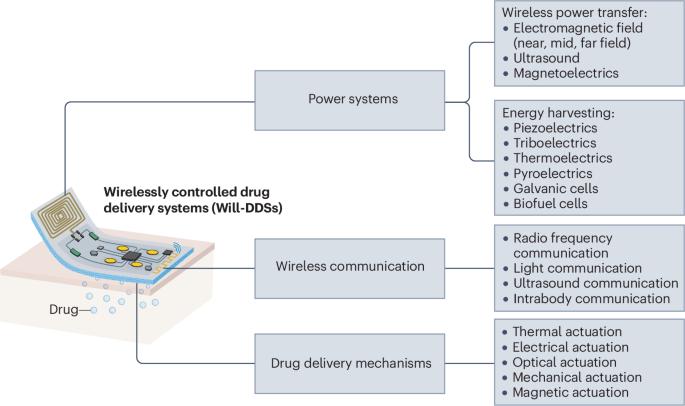Wirelessly controlled drug delivery systems for translational medicine
引用次数: 0
Abstract
Conventional drug delivery systems (DDSs) deliver drugs to specific sites in patients’ bodies, streamlining the drug delivery process of traditional drug prescriptions, but are challenging in dose accuracy, system adaptability and patient compliance. The rapid advancement of wireless bioelectronics technology presents new avenues to develop a class of wirelessly controlled DDSs (Will-DDSs). Featuring wireless control, flexible triggering, miniaturization and integration, Will-DDSs enable controlled and precise drug release profiles at specific sites for personalized treatment. In this Review, we discuss the development in Will-DDSs, focusing on design principles and strategies associated with drug release mechanisms, wireless power supply and communication. Specially, clinical applications ranging from chronic disease management to acute therapeutic interventions are highlighted. Furthermore, we discuss opportunities in adaptability, comprehensiveness and intelligence presented by the integration of Will-DDSs with other advanced technologies as well as the risks and challenges in terms of biosafety, stability and regulation. Wireless bioelectronics integrates untethered controlled-release, wireless power and communication modules into drug delivery systems (DDSs), enabling dynamic, precise drug dosage and release adjustments and shaping the next generation of DDSs — wirelessly controlled DDSs (Will-DDSs).

用于转化医学的无线控制药物输送系统
传统给药系统(dds)将药物递送到患者体内的特定部位,简化了传统药物处方的给药过程,但在剂量准确性、系统适应性和患者依从性方面存在挑战。无线生物电子技术的快速发展为开发一类无线控制dds (will - dds)提供了新的途径。will - dds具有无线控制,灵活触发,小型化和集成化的特点,可以在特定部位进行控制和精确的药物释放,以实现个性化治疗。本文综述了will - dds的研究进展,重点介绍了will - dds在药物释放机制、无线供电和通信等方面的设计原则和策略。特别强调了从慢性病管理到急性治疗干预的临床应用。此外,我们还讨论了will - dds与其他先进技术相结合所带来的适应性、全面性和智能性方面的机遇,以及生物安全性、稳定性和监管方面的风险和挑战。无线生物电子学将不受束缚的控制释放,无线电源和通信模块集成到药物输送系统(dds)中,实现动态,精确的药物剂量和释放调整,并塑造下一代dds -无线控制dds (will - dds)。
本文章由计算机程序翻译,如有差异,请以英文原文为准。
求助全文
约1分钟内获得全文
求助全文

 求助内容:
求助内容: 应助结果提醒方式:
应助结果提醒方式:


